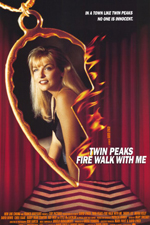 Released: 1992
Released: 1992
Starring: Sheryl Lee, Kyle MacLachlan, Moira Kelly, David Bowie, Chris Isaak, Harry Dean Stanton, Ray Wise, Madchen Amick, Dana Ashbrook
Director: David Lynch
Distributed by: New Line Cinema
“In a town like Twin Peaks, no one is innocent”
A simple elevator pitch of Twin Peaks: Fire Walk With Me would be “its kind of a sequel, and kind of a prequel” but like its source TV show and David Lynch’s other work it is never that cut and dry. At the base of the movie is the story of Laura Palmer (Sheryl Lee) and the few weeks leading to her death, but also there is the story of two FBI agents (Chris Isaak, Kiefer Sutherland) investigating a murder prior to the events of Twin Peaks. Somewhere in between the two is a smaller story of Dale Cooper (Kyle Maclachlan) Albert Rosenfeld (Miguel Ferrer) and Gordon Cole (David Lynch) reprising their roles in a smaller outing showing a tale before the case of Laura Palmer and their strange meeting with Agent Phillip Jeffries (David Bowie).
I can only imagine the difficulty in trying to sum up all the mysteries of Twin Peaks in a two-hour time slot, and inevitably Lynch wasn’t going to play ball with that idea so. Instead, there are three plotlines coexisting in this film, and because of this, it is very hard to recommend this to anyone who hasn’t been a fan of the original series.
The very idea of storytelling in the traditional form is thrown into the wind in Twin Peaks: Fire Walk With Me, similar to the formula of the Twin Peaks TV show. At the core of the plot is the harrowing nightmarish tale of Laura Palmer, her life being warped and torn apart by the physical evils and the more metaphysical evils of the town of Twin Peaks. The performance by Sheryl Lee is a stand out really taking her role to a higher level compared to her more acute scenes in the original series. The time we have to spend with Laura fleshes out her character showing the differing aspects of her and her struggle in life. This gives the viewer a feeling of empathy toward her but also showing she wasn’t such a perfect homecoming queen we once thought she was. This serves to support the findings of Agent Cooper during the progress in the TV Show. We can finally see the person Laura was, and the relationships she had with every character of the show. Opening up the new dialogue and explanation of why each character had certain feelings toward Laura.
Unfortunately, that’s the limit for most explanations to the many mysteries of Twin Peaks that you’re going to get with Twin Peaks: Fire Walk With Me.
A very interesting note to keep in mind is after watching the new series of Twin Peaks almost every scene which at first seemed benign with vacuous scenery chewing now has a retroactive explanation. Certain aspects like the blue rose, the ring, the dialogue between Phillip Jeffries and Gordon Cole now has a very eerie and also brilliant foreboding to the conclusion of the first three episodes of Twin Peaks season three. Making the twists and turns and adding more gravitas to the eureka moments when you on your own figure out certain plot points.
Upon release of Twin Peaks: Fire Walk With Me, the moment when Phillip Jeffries points at Agent Cooper saying “Who do you think that is there?”, and the whole scene and words passed between the characters made little to no sense, very frustratingly so, but almost everything that leaves Jeffries’ mouth has some relevance further down the line which at its core is purely fan service. That phrase should have been used as a warning prior to viewing this movie. It isn’t for those who aren’t into the zany wild world of Twin Peaks. There is little here for anyone who hasn’t seen the show.
The cinematography here is good as always with the typical Lynch overlapping images and close up shots combined with a few jumpscare moments. For one to knock marks off of the film just for David Lynch doing what he does with what he has, seems somewhat criminal and unjust. However, there are two standout moments that just seem to not gel at all and are rather frustrating. The first comes during the great scene with Phillip Jeffries entering the office of Gordon Cole. A startling moment for Agents Dale Cooper and Albert Rosenfeld who are both stunned at the appearance of the long thought lost Agent Jeffries. Jeffries character goes on a long monologue which includes an overlapping image of a strange ensemble of characters who are somewhere else with nothing to do with what is happening with Cooper. The characters in the office include the dancing midget, the evil Bob, a young boy and his grandmother, and other strange characters who may represent the firemen/hobos from season three. Such a great scene started with such great actors and Lynch shows us members of the lodge instead? It also does not give a clearly conveyed message either. If anything, the moments that push the plot forward are with Bowie and the other actors, but instead, we get a dark dank room with backward talking characters all the while we can barely hear Bowie’s monologue. A massive misstep in my own opinion. The second scene is more forgivable. Laura Palmer and her friend Donna Hayworth are both in a bar where an orgy escalates between the many actors in the scene. The characters voices cannot be heard properly harming the scene. Yes, if you live in Europe you can put on subtitles to hear what they are saying. Apparently, Lynch was on two minds whether to let the dialogue be heard or not that by the time he had made up his mind the print had shipped to Europe. On a grander scale, it is forgivable as the scene works well visually without sound.
The scene that encompasses the opening of the film with the characters of Chet Desmond (Chris Isaak) and Sam Stanley (Kiefer Sutherland) is enjoyable if anticlimactic. It feels almost as a side story to the main plot. The other stories push forward the plot while this seems to just linger upon the original mysteries, but ultimately digestible, Laura’s story being the standout of the whole film.
The soundtrack and use of music in the film are great. Almost all of David Lynch’s work is peppered with stellar music by great artists. The Twin Peaks score by Angelo Badalamenti is excellent and brings upon the nostalgia and beauty of the series.
Twin Peaks: Fire Walk With Me on it’s own a total mess of film, music, and characters. With a knowledge and understanding of the first two seasons of the show, it is more enjoyable but still lacking in many areas and still hard to recommend. With a knowledge of the whole series, it is a beautiful, if not expertly put together, bridging tale between all the shows. Its retroactive relevance is amazing with what would appear to be throwaway comments having very lasting meaning and incantations later in the series which makes Twin Peaks: Fire Walk With Me a very bittersweet experience but a nice side story for the die-hard fans of Lynch and Twin Peaks.
Rating:
Thomas C:
“Through the darkness of future’s past, The magician longs to see. One chants out between two worlds… “Fire… walk with me.””


Jack Savage:
While there are some good points to the film (like Sheryl Lee’s portrayal of a living Laura Palmer), Twin Peaks: Fire Walk With Me is definitely not for the mainstream audience. Without the knowledge of the TV series to fill some blanks in the film, it can difficult to understand what is going on. Even being a fan of the series, this movie is hard to watch. There are some deleted scenes and new connections made by Twin Peaks: The Return that smooth out the confusion one may experience watching this movie, but even then, in its original release form, you could pass it by and just watch the show.


Leave a Reply